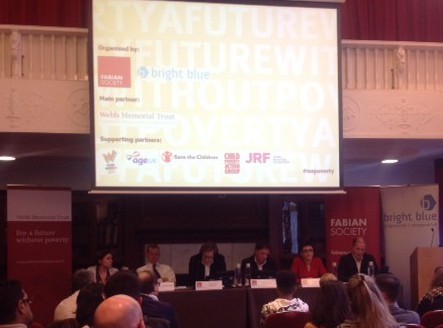A Future Without Poverty – Question Time: Who has the best plan to tackle poverty?
Posted on 23 Mar 2015 Categories: Blog, Events, Event reports
by Georgia Smith
Question Time: Who has the best plan to tackle poverty?
Chair: Ian Birrell, contributing editor, Mail on Sunday
- Jeremy Browne MP, former Home Office minister
- Philip Collins, chief leader writer and columnist, The Times
- Cllr Sarah Hayward, leader, Camden Council
- Ryan Shorthouse, director, Bright Blue
- Nicola Smith, head of economic and social affairs department, TUC
The first question turned on the usefulness of measures of poverty. There was general agreement among the panel that measures were useful but they needed to be more sensitive to take account of the fact that poverty was not just a matter of income. The decisive factor was the ability to participate fully in the life of your society. However, though monetary yardsticks might seem crude and talk of ‘lifting people out of poverty’ patronising, as Philip Collins said, Sarah Hayward remarked that an extra £4 a week could make all the difference to relationship between some who was poor and their society.
Could welfare benefits ever be given a more acceptable face? What people objected to was not people claiming benefits, but the creation of dependence (endemic welfarism, as Jeremy Browne called it) on benefits and abuse of the system. It was a difference between the personal and the abstract for Sarah Hayward. If you knew the circumstances, you could see the need for the benefit. Because of this, she suggested the devolution of some benefits payments – the adults skills budget and benefits aimed at getting people back into work – because ‘you know your own community’. Nicola Smith argued that most welfare payments were popular: pensions, disability and unemployment benefits. What created resentment was benefit fraud in which a tiny minority was involved but which attracted a disproportionate amount of public attention.
Should there be a contributory element to benefits? This government’s Universal Credit proposals supposes such a contribution and, argued Ryan Shorthouse, it enjoyed wide public support. Most in the room, though, felt this raised more difficulties than it solved. How would it work? If you paid more in would you get a better service? What of young people who had never made contributions or those who were unable to? Defenders of a contributory element said it was not a question of reducing benefits for those unable to make contributions, simply that the benefits would be increased for those who had made contributions to the benefits budget and that there was no question of providing a lower level of service in, say, education and health. However, the audience response to the idea of contribution remained generally unfavourable.
There was also some discussion of the idea of equality. Which was more important – equality or equality of opportunity. The latter was crucial to the idea of social mobility, felt Sarah Hayward. Opportunity should not be determined by background.
If equality meant uniformity, said Philip Collins, then it was neither possible nor desirable. In practice, where there was inequality of income, there would be inequality of opportunity. Nicola Smith agreed. You couldn’t have greater equality of opportunity without greater income equality. At the moment, she believed, British society is too unequal for equality of opportunity of opportunity to have any meaning. Philip Collins felt the term had become meaningless and suggested a different formulation: instead of talking about equality or inequality, he believed that being able to live the life you wanted to lead should be the goal of social policy.
Posted on 23 Mar 2015 Categories: Blog, Events, Event reports
